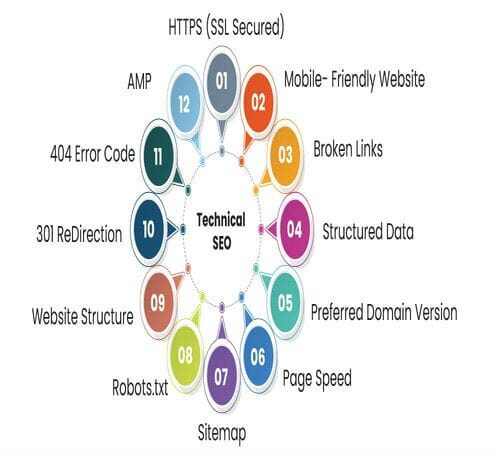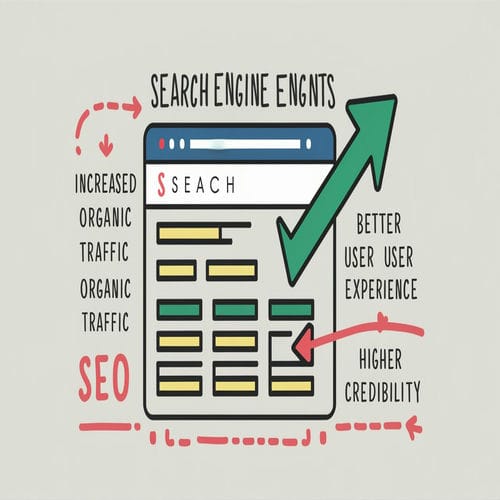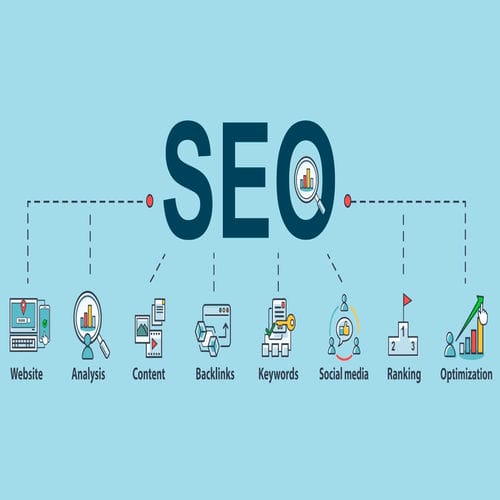Have you ever found yourself marvelling at how certain websites effortlessly claim the top spots in search engine results? Why is Search Engine Optimization important in today’s digital age?
In today’s digital age, mastering the art of Search Engine Optimization (SEO) isn’t just a clever move; it’s a game-changer. When was the last time you searched for something online and went beyond the results’ first page?
Rarely, right? That’s the magic of SEO—the ability to propel your website to the forefront of online visibility.
From boosting your website’s visibility and attracting organic traffic to fostering credibility and trust with your audience, SEO isn’t just about rankings; it’s about connecting with your target audience in meaningful ways.
In this article, we’ll embark on a journey through the intricate landscape of SEO and uncover its profound significance in the digital realm.
What Are the Main Elements of Search Engine Optimization?
1. On-Page SEO
On-page SEO focuses on optimizing individual web pages to improve their search engine rankings and attract more relevant traffic. It involves elements such as:
- Keyword Research and Optimization: Identifying and strategically incorporating relevant keywords into page titles, headings, and content.
- High-Quality Content Creation: Producing valuable, informative content that satisfies user intent and provides solutions to their queries.
- Meta Tags and Descriptions: Optimizing meta tags, including title tags and meta descriptions, to improve click-through rates and enhance search visibility.
2. Off-Page SEO
Off-page SEO refers to strategies implemented outside of your website to improve its authority and relevance in the eyes of search engines. Key elements include:
- Backlink Building: Acquiring quality backlinks from authoritative websites to signal credibility and trustworthiness to search engines.
- Social Media Signals: Engaging with your audience on social media platforms to increase brand visibility and drive traffic to your website.
3. Technical SEO
Technical SEO involves optimizing the technical aspects of your website to ensure it is accessible, indexable, and user-friendly. This includes:
- Site Speed Optimization: Improving page loading times to enhance user experience and search engine rankings.
- Mobile-Friendliness: Ensuring your website is optimized for mobile devices to accommodate the growing number of mobile users.
- Secure Connections (SSL): Implementing SSL certificates to secure data transmission and gain trust from both users and search engines.
- XML Sitemaps and Robots.txt: Creating XML sitemaps to help search engines crawl and index your website efficiently, and using robots.txt to control crawling and indexing behaviour.
This comprehensive approach to SEO covers on-page, off-page, and technical elements, ensuring a well-rounded optimization strategy to improve search engine visibility and drive organic traffic to your website.

Why is Search Engine Optimization Important?
1. Enhancing Online Visibility and Reach
One of the primary reasons SEO is essential is its ability to enhance your website’s visibility and reach. By optimizing your website for relevant keywords and ranking higher in search engine results pages (SERPs), you increase the likelihood of attracting organic traffic from users actively searching for products or services like yours.
This expanded visibility not only increases brand awareness but also allows you to connect with a broader audience, ultimately driving more potential customers to your website.
2. Establishing Credibility and Trust
In today’s digital age, consumers rely heavily on search engines to find information, products, and services. When your website consistently appears at the top of search results for relevant queries, it signals to users that you are a credible and trustworthy authority in your industry.
This trust factor significantly influences purchasing decisions, as users are more likely to choose businesses they perceive as reliable and reputable. By investing in SEO and achieving higher rankings, you can establish and reinforce your brand’s credibility, fostering long-term relationships with your audience.
3. Driving Targeted Traffic and Conversions
Unlike traditional advertising methods that cast a wide net in hopes of reaching potential customers, SEO allows you to target specific demographics and user intent.
By optimizing your website for relevant keywords and creating high-quality, informative content tailored to your target audience, you attract highly qualified traffic that is more likely to convert into leads or customers.
This targeted approach not only maximizes your marketing ROI but also enhances user satisfaction, as visitors find exactly what they’re looking for when they land on your site.
4. Remaining Competitive in the Digital Landscape
In today’s fiercely competitive digital landscape, businesses that neglect SEO risk falling behind their competitors. With more consumers turning to search engines to research products and services, appearing at the top of search results is crucial for maintaining a competitive edge.
By investing in SEO and staying ahead of industry trends and algorithm updates, you can ensure that your business remains visible, relevant, and competitive in the ever-evolving online marketplace.
The relevance of SEO is discussed in detail, highlighting its role in enhancing online visibility, establishing credibility, driving targeted traffic, and remaining competitive in the digital landscape. By understanding the significance of SEO, businesses can leverage its power to achieve their marketing goals and thrive in today’s competitive online environment.

AI and SEO
1. The Rise of Artificial Intelligence in SEO
Artificial Intelligence (AI) is reshaping the landscape of digital marketing, and nowhere is its impact more profound than in Search Engine Optimization (SEO).
AI algorithms analyze vast amount of data to identify patterns, trends, and user behaviour, enabling marketers to optimize their strategies with unparalleled precision.
As AI technology continues to advance, businesses must adapt and leverage these capabilities to stay competitive in the ever-evolving digital marketplace.
2. Predictive Analysis for Strategic Insights
One of the most significant benefits of AI in SEO is its ability to conduct predictive analysis and forecast future trends. By analyzing historical data and identifying emerging patterns, AI algorithms can help marketers anticipate shifts in search algorithms, consumer behaviour, and market dynamics.
By gaining knowledge of these strategic insights, businesses can adjust their SEO strategies proactively, ensuring they stay ahead of the curve and capitalize on new opportunities.
3. Personalization the User Experience
AI-driven personalization is revolutionizing the way businesses engage with their audience. By analyzing user data and preferences, AI algorithms can deliver personalized search results and recommendations tailored to individual interests and needs.
This level of customization not only enhances the user experience but also increases engagement and conversion rates. By utilizing AI-powered personalization techniques, businesses can make deeper connections with their audience and drive measurable results.
4. Automating Routine Tasks for Efficiency
AI technology automates repetitive tasks and streamlines SEO processes, freeing up valuable time and resources for marketers. From keyword research and content optimization to link building and performance tracking, AI-powered tools can handle a wide range of tasks with speed and precision.
By automating these routine tasks, businesses can focus their efforts on strategic initiatives and creative endeavors, maximizing their impact and driving tangible results.
5. Embracing the AI Revolution
AI is transforming the way businesses approach SEO, offering unprecedented opportunities for optimization and innovation.
By harnessing the power of AI algorithms, businesses can gain strategic insights, personalize the user experience, and automate routine tasks, ultimately driving greater visibility, engagement, and success in the digital marketplace.
As AI continues to evolve, businesses that embrace this technology will be best positioned to thrive in the dynamic world of digital marketing.

Why Is SEO So Important for Your Business?
1. Driving Organic Traffic and Qualified Leads
SEO is the cornerstone of a successful digital marketing strategy, especially for businesses looking to attract organic traffic and qualified leads.
By optimizing your website for relevant keywords and ranking higher in search engine results pages (SERPs), you increase your visibility to potential customers actively searching for products or services like yours.
This targeted approach not only drives more traffic to your website but also ensures that the visitors you attract are highly qualified leads, more likely to convert into paying customers.
2. Cost-Efficiency Compared to Paid Advertising
Unlike traditional advertising methods that require substantial upfront investments, SEO offers a cost-effective alternative with long-term benefits. While paid advertising can deliver immediate results, it often requires ongoing investment to maintain visibility.
In contrast, SEO efforts, once implemented, can continue to drive organic traffic and generate leads over time, without additional costs. By investing in SEO, businesses can maximize their marketing ROI and achieve sustainable growth without breaking the bank.
3. Establishing Brand Authority and Trust
In today’s competitive marketplace, establishing brand authority and trust is essential for attracting and retaining customers. When your website consistently appears at the top of search results, it signals to users that you are a credible and trustworthy authority in your industry.
This trust factor significantly influences purchasing decisions, as users are more likely to choose businesses they perceive as reliable and reputable. By investing in SEO and achieving higher rankings, you can enhance your brand’s authority and trustworthiness, making long-term relationships with your audience.
4. Increasing Customer Engagement and Retention
SEO not only helps attract new customers but also enhances engagement and retention among existing ones. By delivering high-quality, informative content that meets the needs and interests of your target audience, you can keep them engaged and coming back for more.
Whether through blog posts, informative articles, or engaging multimedia content, SEO enables you to connect with your audience on a deeper level, building loyalty and trust that translates into repeat business and long-term success.
5. Supporting Local Businesses and Community Engagement
For local businesses, SEO is especially crucial for attracting nearby customers and fostering community engagement.
By optimizing your website for local search queries and leveraging tools like Google My Business, you can ensure that your business appears in local search results when users in your area are looking for products or services like yours.
This increased visibility not only drives foot traffic to your storefront but also strengthens your ties to the local community, building a loyal customer base and driving sustainable growth.
Cost-Effectiveness
1. Comparison of SEO to Paid Advertising (PPC)
When it comes to allocating your digital marketing budget, the comparison between SEO and paid advertising, such as Pay-Per-Click (PPC), is often a significant consideration. While PPC can yield immediate results, it requires ongoing investment to maintain visibility.
Conversely, SEO efforts, once established, can continue to drive organic traffic and generate leads over time without incurring additional costs. This makes SEO a cost-effective option in the long run, offering a higher return on investment (ROI) compared to PPC.
2. Long-term Benefits and Sustainability of SEO Investments
Investing in SEO offers long-term benefits and sustainability for your business. Unlike paid advertising, which stops generating traffic once the budget is exhausted, SEO efforts can provide a lasting impact.
By improving your website’s visibility and ranking in search engine results, you can attract organic traffic and qualified leads consistently over time.
Moreover, as your SEO efforts compound and your website gains authority, you may require less ongoing optimization, further enhancing the sustainability of your investment.
3. Examples of ROI from SEO Efforts
The return on investment (ROI) from SEO efforts can be significant, with many businesses experiencing substantial growth and revenue generation as a result.
For example, a local bakery that invests in SEO to optimize its website for local search queries may see a substantial increase in foot traffic and online orders from nearby customers.
Similarly, an e-commerce store that focuses on SEO to improve its visibility for relevant product keywords may experience an increase in sales and conversions. These examples illustrate how effective SEO strategies can deliver tangible results and a measurable return on investment for businesses of all sizes.
Targets the Right Audience
1. Role of Keyword Research
Keyword research is the foundation of any successful SEO strategy, enabling businesses to identify the search terms and phrases their target audience is using.
By conducting thorough keyword research, businesses can tailor their content and optimization efforts to align with the interests, needs, and demographics of their target audience.
This targeted approach ensures that businesses attract the right audience and deliver content that resonates with their intended demographic.
2. Benefits of Local SEO for Local Businesses
For local businesses, utilizing local SEO strategies is essential for reaching nearby customers and driving foot traffic to physical storefronts.
By optimizing their website and online presence for local search queries, businesses can ensure that they appear in local search results when users in their area are looking for products or services like theirs.
This increased visibility not only helps local businesses attract more customers but also encourages community engagement and loyalty.
3. How SEO Aligns with Customer Intent and Search Behaviour
One of the strengths of SEO is its ability to align with customer intent and search behaviour. By understanding the intent behind user search queries, businesses can create content that addresses their audience’s needs and provides valuable solutions.
Whether users are searching for information, products, or services, SEO enables businesses to meet their needs and deliver relevant content at every stage of the customer journey. This alignment encourages a positive user experience, increases engagement, and ultimately drives conversions and business growth.

Supports Content Marketing
1. Importance of High-Quality, Relevant Content
Content is king in the realm of SEO, and high-quality, relevant content is essential for driving organic traffic and engaging your audience.
By creating valuable content that addresses the needs and interests of your target audience, businesses can attract more visitors to their website and establish themselves as authoritative voices in their industry.
From blog posts and articles to videos and infographics, content marketing plays a crucial role in SEO success.
2. How SEO Helps Content Get Discovered
Even the most compelling content is ineffective if it remains hidden from your target audience. SEO helps content get discovered by optimizing it for relevant keywords and improving its visibility in search engine results.
By incorporating strategic keywords, optimizing meta tags, and building quality backlinks, businesses can ensure that their content ranks higher in search results and reaches a broader audience.
3. Synergy Between SEO and Content Marketing Strategies
SEO and content marketing are symbiotic disciplines that work hand in hand to achieve common goals. While SEO ensures that content is discoverable and ranks well in search engines, content marketing provides the substance and value that attracts and engages users.
By integrating SEO best practices into their content marketing strategies, businesses can maximize the visibility, reach, and impact of their content, driving organic traffic, and delivering measurable results.
Conclusion
Search Engine Optimization (SEO) is undeniably crucial for businesses seeking to thrive in the competitive digital landscape. By prioritizing SEO strategies, businesses can enhance their online visibility, attract qualified traffic, and establish authority within their respective industries.
As the digital realm continues to evolve, investing in SEO remains a cornerstone of effective marketing strategies.
If you’re ready to elevate your online presence and unlock your business’s full potential, visit Devtrain.co to explore our comprehensive SEO services and take the first step towards achieving your digital marketing goals.



binance
I don’t think the title of your article matches the content lol. Just kidding, mainly because I had some doubts after reading the article.
binance推薦代碼
Your point of view caught my eye and was very interesting. Thanks. I have a question for you.